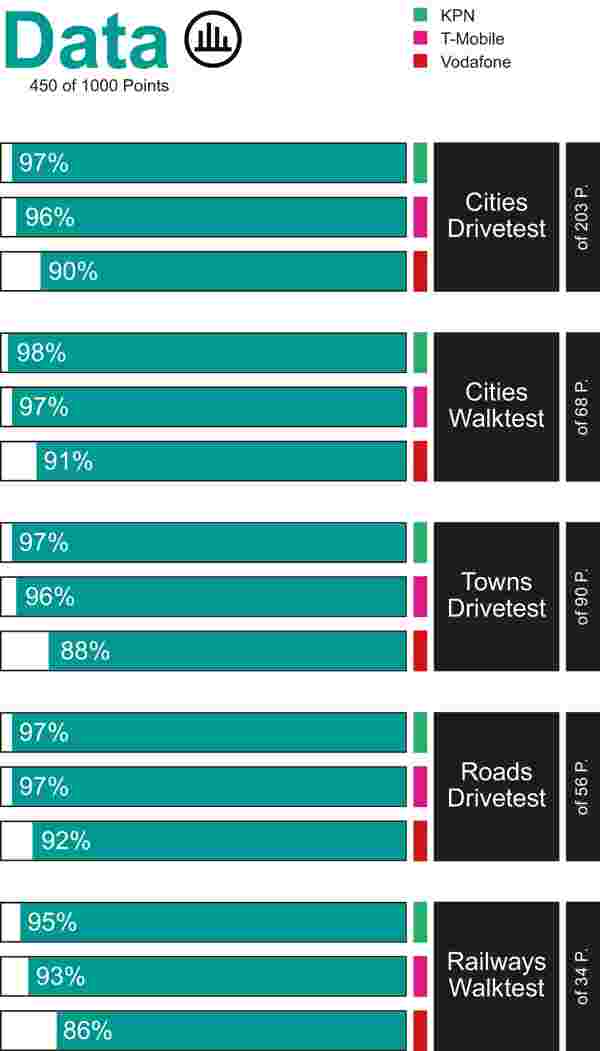Container for the scroll indicator
(Will be hidden in the published article)
All three Dutch networks claim to cover a large part of the population with their 4G/LTE services. Their constant race for the best coverage and the highest data rates has helped to establish an overall very good availability of 4G in the Netherlands. Now the race continues regarding 5G – and again, there is a fierce competition among the three network operators to lead the field regarding this new mobile network technology.
The commercial deployment of 5G in the Netherlands has come so far that we assume this standard as a given in the data tests of this year‘s umlaut connect Mobile Benchmark in the Netherlands. So, the Samsung S21+ smartphones carried by our two drive test cars and also by the two walk test teams were configured to prefer 5G – whenever this technology is available, it should also be used for our data measurements. But also in terms of 4G/LTE, the mobile network technology has come a long way. In many areas where there is no 5G yet, the test smartphones could still benefit from “carrier aggregation” – the combined use of LTE carrier frequencies. It is the technical basis for the so-called “4G+” services which theoretically support data rates up to 1 Gbps.
umlaut‘s testing rewards fast throughputs as well as the networks'
availability and stability. In order to assess typical performance as well as peak speeds, we consider two values: the minimum data rate that is available in 90 per cent of the cases, and additionally the peak data rate that is surpassed in 10 per cent of the cases. Web page and file downloads or file uploads reward fast speeds, while the determination of success ratios and assessing Youtube playouts concentrate on reliability aspects.

KPN LEADS in data drive tests conducted in the biG cities, T-mobile FOLLOWS CLOSELY and vodafone a little further behind
In the drive tests conducted in 21 larger Dutch cities, KPN leads by a narrow margin, followed by T-Mobile and at a little more distinct gap by Vodafone. KPN and T-Mobile offer excellent success ratios for all tested data services. In the Vodafone network, these numbers are still very good, but a little behind the top two competitors – particularly in the areas of web browsing and file uploads. Also, the throughputs determined in the Vodafone network rank a little behind the two top competitors.
KPN AHEAD OF T-Mobile ALSO IN BIG CITY DATA Walk testS, vodafone on third Rank
In the overall results of the walk tests conducted in Amsterdam, Dordrecht, Eindhoven, Leiden, Rotterdam, the Hague, Tilburg and Utrecht, KPN also scores ahead of T-Mobile, Again, the distance between the two top contenders is very narrow, while Vodafone follows at a little more distinct distance. As observed in the big city drive tests, Vodafone loses some points regarding the success ratios of web browsing and file uploads as well as for the determined throughputs.
Towns
Drivetest
KPN
KPN AHEAD IN DATA DRIVE TESTS IN SMALLER TOWNS, WITH T-MOBILE FOLLOWING CLOSELY AND VODAFONE AT A SOMEWHAT WIDER DISTANCE
In the data drive tests that our measurement cars performed in 13 smaller Dutch towns, KPN takes the lead with the highest success ratios and overall very good results. T-Mobile follows closely at a distance of just one percentage point, with also very good success ratios and data rates. The gap to Vodafone, which ranks third in this discipline, is a little more distinct.
KPN AND T-MOBILE ON A PAR ON CONNECTING ROADS, VODAFONE RANKS THIRD WITH A SLIGHTLY HIGHER PERFORMANCE LEVEL THAN IN CITIES OR TOWNS
On the connecting roads covered by our test cars, KPN and T-Mobile rank on a par. For motorists, it is good news that the overall performance level of the two leading contenders on Dutch roads is comparable to that in the larger cities. Vodafone again follows at a somewhat more distinct distance, but at an overall higher performance level than this operator reached in the towns or even in the cities.
Railways walktest
KPN
KPN AHEAD IN TRAINS, CLOSELY FOLLOWED BY T-MOBILE AND AT A SOMEWHAT WIDER GAP BY VODAFONE
Mobile data connections in trains are particularly demanding. After already achieving very good results in the voice tests conducted on Dutch railways, the three operators also perform convincingly in the according data tests. Overall, KPN is ahead in this discipline, offering very good success ratios and per formance KPIs. T-Mobile follows closely with also convincing results. Vodafone ranks third at a somewhat wider gap, but still reaches a high performance level which is not too far behind its own results in the smaller Dutch towns.
5G AT ALREADY VERY HIGH LEVEL IN THE NETHERLANDS
After the end of the 5G frequency auction in July 2020, the Dutch mobile operators started their 5G deployment very quickly. Vodafone had started 5G ahead of the competitors on already available frequencies even in April 2020. KPN and T-Mobile launched their 5G networks at the end of July 2020. Based on the acquired spectrum, all three Dutch mobile networks operate 5G on 700 MHz, 1400 MHz and 2100 MHz. In difference to other European countries, the 3600 MHz band is not yet available for 5G in the Netherlands as at the time of writing as it is currently still being used by the country’s defence satellite system. However, this will change, and a frequency auction for this part of the spectrum is scheduled for later in 2022.KPN expects to cover 95 per cent of the Netherlands by the end of 2022. In early 2022, it claimed that its 5G network reaches 81 per cent of the population. T-Mobile claimed to already reach about 98 per cent of the Dutch population with 5G and plans to rise the number further in the near future. Vodafone claims to have already reached national coverage with 5G.
KPN AHEAD IN 5G COVERAGE IN BIGGER CITIES, T-MOBILE LEADS IN 5G COVERAGE OF SMALLER TOWNS, ROADS AND RAILWAYS. VODAFONE PREFERABLY USES 5G-DSS.
In all tested scenarios, all three Dutch operators achieved a high amount of 5G coverage. KPN leads in terms of 5G coverage in the bigger cities, while T-Mobile provides the highest share of 5G coverage in the smaller towns, on the roads and on railways. The obtained data samples indicate that Vodafone preferably uses 5G DSS (dynamic spectrum sharing – switching between 4G and 5G on the same frequency band as needed). As a representative example, below we look at the results of samples with 5G in the 7 second Download tests. Here, KPN achieves the highest data rates, followed by T-Mobile and then Vodafone. The slower data rates in Vodafone‘s 5G network are a consequence of the 5G DSS chosen by this operator. In all three Dutch networks, the 5G shares seen in this and the other aggregations are already considerable.

Container for the dynamic page
(Will be hidden in the published article)
